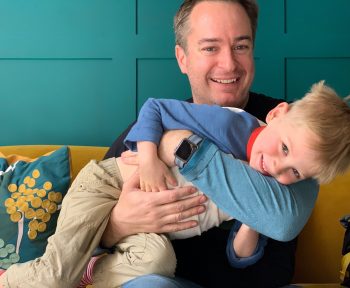By Claire Howard |
In a cozy Venezuelan kitchen, a young girl named Kalamata learns to cook meringues and falls in love with the magic of creating deliciousness. In the south of France, she experiences the delight of a foreign cuisine and the rich cultural heritage it carries. In an apple orchard, she learns how food is tied irrevocably to sensations of home – just as the smell of an apple pie in the oven washes a wave of comforting nostalgia over us.

Derek Wallace ’00 created the children’s book character Kalamata and his company Kalamata’s Kitchen in fifteen minutes while watching a Chef’s Table episode on Netflix. Through this the show that told stories of renowned international chefs, Wallace was struck by the powerful role food plays in opening minds to connect with different cultures.
“I remember thinking to myself all of the things exploring food taught me in understanding people and traditions. It helped make me a more empathetic and compassionate person.”
Struck by this self-recognition, Wallace wanted to use food as a key to open kids’ minds to cultures and new experiences. In those simple few minutes of being moved by the stories of international cuisine from a tv show, he created the character Kalamata who would travel the world telling children her stories discovering food from her enthralling adventures. He called his friend, Sarah Thomas, a sommelier at the prestigious Le Bernardin and whose diverse background as the child of Indian immigrants and a graduate of Cambridge University in English renaissance literature served as the inspiration for Kalamata’s character, and together they self-published the first book about Kalamata’s adventures in Venezuela with her best friend, a stuffed alligator.
That moment of inspiration to create a company that showed kids the wonder of culture through food came to Wallace four years ago. Since then, he and Thomas have created a successful company that’s currently partnered with Chobani and has been featured in prominent news spotlights. Their growth has been built on a dream of raising an open-minded generation and fueled by Wallace and Thomas’ passion for that goal.
“Kalamata is all about creating a more curious, compassionate generation of eaters. We believe that we can break down biases in kids at a young age through food.” Wallace spoke of his idea that constant exposure to new things, such as different types of food, shape kids’ minds to readily embrace diversity and new experiences.
The company doesn’t just stop at telling wonderful stories but overflows with products teaching children to love the world around them. Their Tastebud Travels series gives restaurant guides through major US cities, helping families bond together over exploration of various cuisines in their own cities. Their website offers free downloadable activities urging kids to cook new dishes, use a new spice, or ask others about their favorite food memories. Kalamata’s Kitchen illustrates the joy of sharing food and viewing it as an exploration through experiences and cultures.
Wallace always knew he wanted to utilize his career for social entrepreneurship. It’s a goal he implemented throughout his entire life. During his studies at Syracuse University e earning a degree in policy studies in the Maxwell School of Citizenship and Public Affairs, Wallace worked for the Shaw Center and started several community outreach programs such as Shooting for As, which helped Syracuse kids strive for athletic and academic success, and launched the literacy initiative Balancing the Books. He became involved with the Syracuse University LaunchPad when he judged the Hult Prize and gave a Fireside Chat as he was just starting the company, and has remained involved, helping mentor Syracuse University student food startups.
After college, Wallace found a job in marketing and sales in a corporate environment. Though highly successful in this role, he was always motivated by a mission impacting the world positively and grew discontent at the structural exclusion for people from diverse backgrounds that was often prevalent in corporate environments. Still he was always launching initiatives for social good and started a program in his company for inclusion and diversity. His drive to use his life to add positivity into the world motivated him to leave the corporate world to start Kalamata’s Kitchen.
“Everything we do has to bring something valuable to the world,” Wallace said of his motivation to start the company. “It seemed like an impossible dream.”
But this impossible dream of making the world a better place through telling stories of food has turned tangible. The creation of Kalamata’s Kitchen was fueled by a simple wish to add joy into the world ‑ to use something so simple as food to bring delight to kids and create a more open-minded society. Wallace’s lifelong story of bringing value to the world is a hopeful reminder to ourselves whether that’s during our time at Syracuse, through a corporate job, or starting our own company, we have the power to contribute value wherever we are.
—
Originally published on October 21, 2020 here.